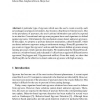Free Online Productivity Tools
i2Speak
i2Symbol
i2OCR
iTex2Img
iWeb2Print
iWeb2Shot
i2Type
iPdf2Split
iPdf2Merge
i2Bopomofo
i2Arabic
i2Style
i2Image
i2PDF
iLatex2Rtf
Sci2ools
83
Voted
SEC
2008
2008
HoneyID : Unveiling Hidden Spywares by Generating Bogus Events
A particular type of spyware which uses the user's events covertly, such as keyloggers and password stealers, has become a big threat to Internet users. Due to the prevalence of spywares, the user's private information can easily be exposed to an attacker. Conventional anti-spyware programs have used signatures to defend against spywares. Unfortunately, this mechanism cannot detect unknown spywares. In this paper, we propose a spyware detection mechanism, called HoneyID, which can detect unknown spywares using an enticement strategy. HoneyID generates bogus events to trigger the spyware's actions and then detects hidden spywares among running processes which operate abnormally. We implemented the HoneyID mechanism as a windows based, and evaluated it's effectiveness against 6 different known spywares(3 keyloggers and 3 ftp password sniffers). From this study, we show that the HoneyID can be effective to detect unknown spywares with high accuracy.
| Added | 30 Oct 2010 |
| Updated | 30 Oct 2010 |
| Type | Conference |
| Year | 2008 |
| Where | SEC |
| Authors | Jeheon Han, Jonghoon Kwon, Heejo Lee |
Comments (0)

